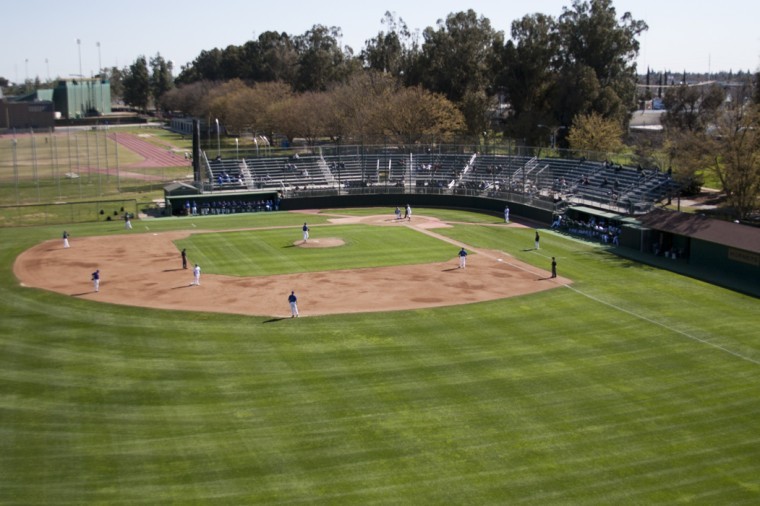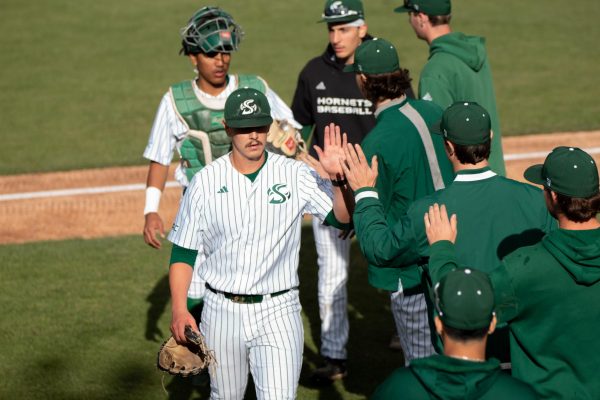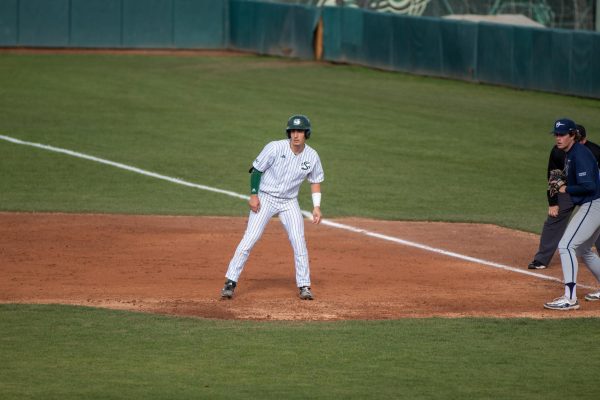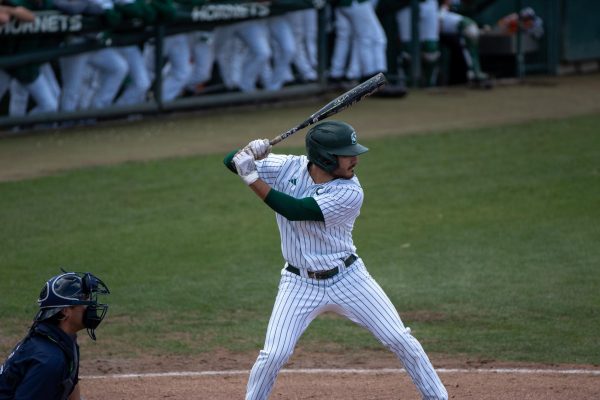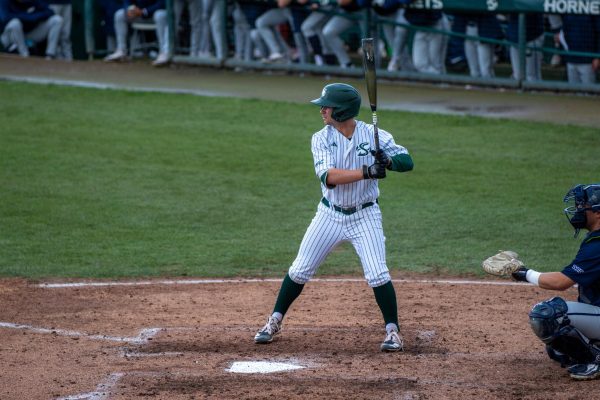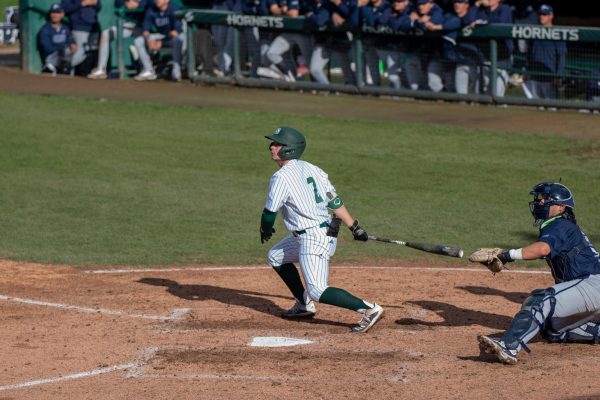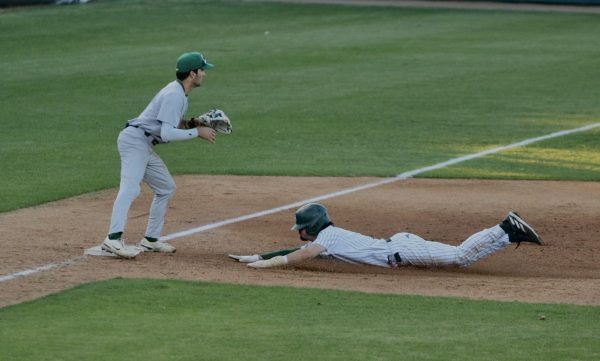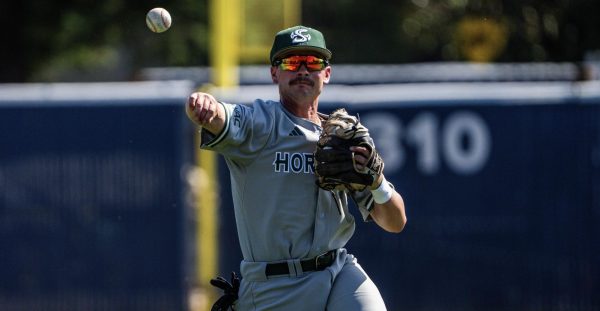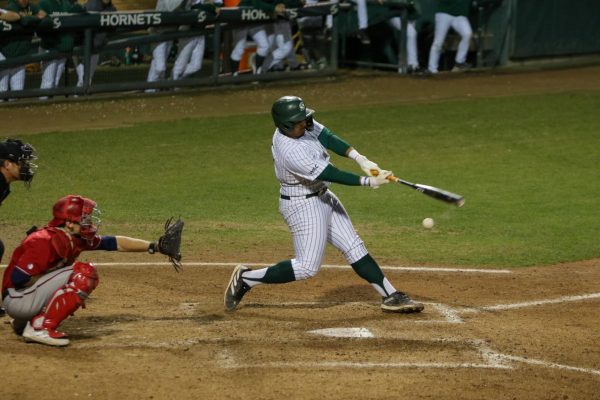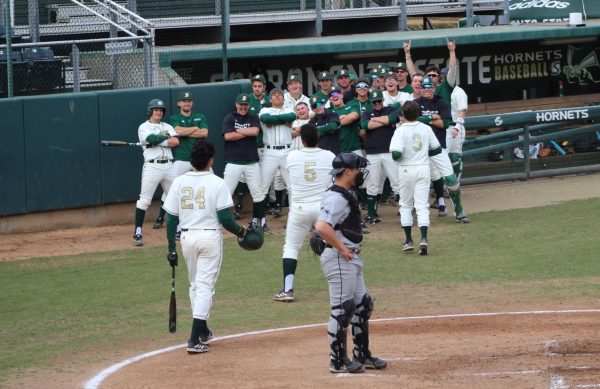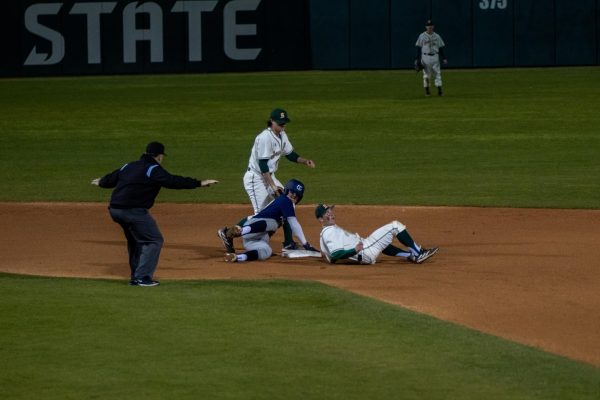Lights may benefit players and fans of baseball
Picture taken from the top of the parking structure overlooking baseball’s John Smith Field. The 59-year-old stadium was remodeled in 2002, but installing lights could cost up to an additional $600,000.
March 14, 2012
Sacramento State baseball coaches and players said they believe the addition of lights on the Hornet’s baseball field would remedy the limitations of daylight-only practices, games and low spectator attendance while opening up more opportunities for adapting to playing other fields.
John Smith Field, home of Hornets’ baseball, was built in 1953 and renovated in 2002 with the addition of VIP seating. The field was then renamed in 2010 after former head coach John Smith, who coached for 32 seasons and retired after the 2009-10 season.
The field can seat more than 1,000 spectators, has hosted two NCAA Division II West Regional playoffs but is missing stadium lights, limiting the Hornets to hold home games and practices to daylight hours.
Sacramento State Director of Facilities and Operations Steve Tebbs said the athletic department is considering installing lights on the field, but the cost of the installation and logistics of operating the system makes the goal difficult.
“It’s not only the lighting itself, but it’s all the underground work you have to do to get the electricity out there to run the lights and where you run the electricity from,” Tebbs said, “There is more entailed than putting lights up and flipping the switch.”
Director of Athletics, Dr. Terry Wanless, said the estimated cost of lights for the field would be between $600,000 and $700,000, and the project would have to be privately funded but would improve the field and the program offered at Sac State.
“We would like to have lights, we think it would be a great opportunity to enhance our baseball program, so it’s something on our radar,” he said.
Tebbs said lights would help with spectator attendance with the inclusion of Friday and Saturday night games and appeal to student body and other fans unable to watch the afternoon games.
“Usually on Fridays during the day, people have school and work, but at seven or six on Friday night, they could come out and enjoy the game and hang out,” said senior infielder Derrick Chung.
Wanless said lights would give fans a better opportunity to enjoy the sport in a more relaxed setting in the evening, where they could sit back and enjoy the pace of a baseball game.
“Night baseball is a part of our American heritage,” he said. “People would be attracted to going to a baseball activity, a positive social event at night.”
Head coach Reggie Christiansen said the installation of stadium lights would provide a range of benefits for the Hornets.
Academically, he said the team would have more time in class, enroll in afternoon classes otherwise taken away by game times and it can take advantage of the tutors in the afternoon.
“I think our attendance would triple, it’s difficult for people to come to our afternoon games,” Christiansen said. “I think it would be good for recruiting, from an academic standpoint, keep our guys in class longer.”
Chung said when he was younger, he had trouble maintaining his classes, sometimes skipping sessions, missing lectures and even midterms to attend afternoon games, affecting his GPA.
“I wasn’t able to take classes during the day or if there was a GE class I had to take, I would not be able to go to class and had to skip it for baseball,” he said.
He said the inclusion of lights would give an advantage on away games where the team plays at night, having night practices would give experience to the Hornets and have the knowledge and skill to play at night.
“It’s a much different game playing at night than in the daytime, honestly going into those places like UCLA and University of the Pacific, it’s tough on our guys,” he said.
Christiansen said the team has practiced in the lit Dan McAuliffe Field, located across from Napa Hall, once this season, but the use of the field by other leagues makes regular night practices difficult for the team.
Wanless said lights would also have an impact on recruiting, where prospective student-athletes would be attracted to come to Sac State.
“If you could attract high-quality players, then you (the team) are going to get better,” he said. “I think if you could create the right atmosphere, I think you might be able to attract players that could make a difference.”
Chung said the team is at a disadvantage without the practice of playing night games but personally prefers playing in the daytime.
“I’m used to playing under the sun: in high school and here, I have been playing at this field for five years without lights and gotten used to it,” he said.
Not having the opportunity to practice at night limits the Hornets. Chung said during gaps in its schedules and after home games, the team meets on the field or in the batting cages during daylight hours to improve on ground balls and batting.
“We make the best out of it, most of the time after practice we come here to the cages and try to get extra work done,” Chung said. “We try to be out here in the morning and between classes to do whatever we can do.”
“We would love to have lights on the field,” Chung said. “When you don’t play at night at all, it’s really hard to get used to for the first five, six innings, it would be great to have lights.”
Wanless said the addition of lights would be a positive for all on campus, and increase the interest in the Hornets and the sport itself, adding to a commitment the faculty has to the students.
“One of our responsibilities is to enhance the quality of student life and baseball would be a part of that improvement,” he said.
Christiansen said lights on the field would attract a larger crowd that loves the game of baseball.
“Baseball at night is an unbelievable atmosphere that you can create,” Christiansen said. “Sacramento is a baseball town, it’s really difficult to get people to come to our games at two o’clock in the afternoon.”
Joe de Ocampo can be reached at [email protected].





























































































































